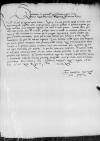List #6348
Sigismund I Jagiellon do Ioannes DANTISCUSBrest-Litovsk, 1544-08-17
| odebrano Heilsberg (Lidzbark), 1544-08-24 Rękopiśmienne podstawy źródłowe:
| ||||
Tekst + aparat krytyczny + komentarz Zwykły tekst Tekst + komentarz Tekst + aparat krytyczny Ekscerpty dotyczące podróży Dantyszka
Reverendo in Christo Patri, domino
Reverende in Christo Pater, sincere nobis dilecte.
Quod Paternitas Vestra non gravatim fecisse se cf. , CIDTC IDL 7494⌊scribitcf. , CIDTC IDL 7494⌋, ut ad
Porro, quid in causa Pucensi fieri velimus a Paternitate Vestra, ex cf.
Bene valeat Paternitas Vestra.
Dat(ae) or Dat(um)⌈Dat(ae)Dat(ae) or Dat(um)⌉
in
Ex commissione


 BCz, 1601, p. 498
BCz, 1601, p. 498